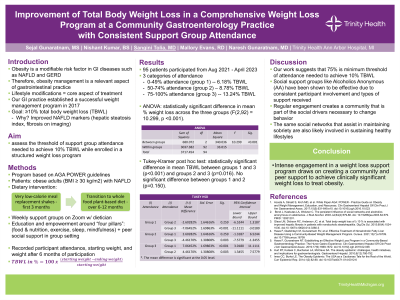Sunday Poster Session
Category: Obesity
P1166 - Improvement of Total Body Weight Loss in a Comprehensive Weight Loss Program at a Community Gastroenterology Practice with Consistent Support Group Attendance
Sunday, October 22, 2023
3:30 PM - 7:00 PM PT
Location: Exhibit Hall

Has Audio

Sangini Tolia, MD
Trinity Health St. Joseph Mercy Hospital-Ann Arbor
Ann Arbor, MI
Presenting Author(s)
Sejal Gunaratnam, BS, MS1, Nishant Kumar, BS1, Sangini Tolia, MD2, Mallory Evans, RD3, Naresh Gunaratnam, MD3
1University of Michigan, Ann Arbor, MI; 2Trinity Health St. Joseph Mercy Hospital-Ann Arbor, Ann Arbor, MI; 3Huron Gastroenterology, Ann Arbor, MI
Introduction: The increasing prevalence of obesity places a high burden on the economy with annual medical expenses approximating 150 billion dollars. Obesity-related gastrointestinal disorders, including non-alcoholic fatty liver disease (NAFLD), account for over 30% of patient visits to community GI practices. Total body weight loss (TBWL) of 10% or more is associated with reversal of NAFLD-associated fibrosis and steatosis. However, achieving this goal alone can be difficult. Support groups have proven to be vital in allowing individuals to recover from other lifestyle diseases like alcohol overuse. The aim of this study was to assess the impact of support group attendance on a patient achieving 10% TBWL while enrolled in a structured, community-based weight loss program.
Methods: Patients enrolled in the weight-loss program participated in a 6 month support group with weekly online meetings. These sessions included discussions of shared experiences and education on the 4 pillars of the program - nutrition, exercise, sleep, and mindfulness. TBWL was calculated by taking the difference of the patients starting weight and their 6 month weight divided by the starting weight. Data was collected retrospectively through chart review. By April 2023, a total of 95 patients completed the support group program. Statistical analysis was performed using ANOVA and Tukey-Kramer post-hoc tests.
Results: The mean percent weight loss was 6.30% for the group with 0-50% attendance, 9.30% for the group with 51-75% attendance, and 13.15% for the group with 76-100% attendance. A one-way ANOVA revealed a statistically significant difference in the percent weight loss across the three groups (F(2,92) = 8.66, p < 0.001). Further analysis with a Tukey-Kramer post-hoc test revealed a significant difference in percent weight loss between the group with 76-100% attendance and groups with 0-50% attendance (p< 0.05) and 51-75% attendance (p< 0.05). There was no significant difference in percent weight loss between the groups with 0-50% and 51-75% attendance (p >0.05).
Discussion: The results of this study indicate that patients with more than 75% attendance at support group meetings across a six-month period reported significantly higher percent weight loss than patients with lower attendance. This study supports the efficacy of support group meetings toward achieving weight loss. Further studies with larger sample sizes are ongoing to measure the efficacy of support groups on a long-term basis.
Disclosures:
Sejal Gunaratnam, BS, MS1, Nishant Kumar, BS1, Sangini Tolia, MD2, Mallory Evans, RD3, Naresh Gunaratnam, MD3. P1166 - Improvement of Total Body Weight Loss in a Comprehensive Weight Loss Program at a Community Gastroenterology Practice with Consistent Support Group Attendance, ACG 2023 Annual Scientific Meeting Abstracts. Vancouver, BC, Canada: American College of Gastroenterology.
1University of Michigan, Ann Arbor, MI; 2Trinity Health St. Joseph Mercy Hospital-Ann Arbor, Ann Arbor, MI; 3Huron Gastroenterology, Ann Arbor, MI
Introduction: The increasing prevalence of obesity places a high burden on the economy with annual medical expenses approximating 150 billion dollars. Obesity-related gastrointestinal disorders, including non-alcoholic fatty liver disease (NAFLD), account for over 30% of patient visits to community GI practices. Total body weight loss (TBWL) of 10% or more is associated with reversal of NAFLD-associated fibrosis and steatosis. However, achieving this goal alone can be difficult. Support groups have proven to be vital in allowing individuals to recover from other lifestyle diseases like alcohol overuse. The aim of this study was to assess the impact of support group attendance on a patient achieving 10% TBWL while enrolled in a structured, community-based weight loss program.
Methods: Patients enrolled in the weight-loss program participated in a 6 month support group with weekly online meetings. These sessions included discussions of shared experiences and education on the 4 pillars of the program - nutrition, exercise, sleep, and mindfulness. TBWL was calculated by taking the difference of the patients starting weight and their 6 month weight divided by the starting weight. Data was collected retrospectively through chart review. By April 2023, a total of 95 patients completed the support group program. Statistical analysis was performed using ANOVA and Tukey-Kramer post-hoc tests.
Results: The mean percent weight loss was 6.30% for the group with 0-50% attendance, 9.30% for the group with 51-75% attendance, and 13.15% for the group with 76-100% attendance. A one-way ANOVA revealed a statistically significant difference in the percent weight loss across the three groups (F(2,92) = 8.66, p < 0.001). Further analysis with a Tukey-Kramer post-hoc test revealed a significant difference in percent weight loss between the group with 76-100% attendance and groups with 0-50% attendance (p< 0.05) and 51-75% attendance (p< 0.05). There was no significant difference in percent weight loss between the groups with 0-50% and 51-75% attendance (p >0.05).
Discussion: The results of this study indicate that patients with more than 75% attendance at support group meetings across a six-month period reported significantly higher percent weight loss than patients with lower attendance. This study supports the efficacy of support group meetings toward achieving weight loss. Further studies with larger sample sizes are ongoing to measure the efficacy of support groups on a long-term basis.
Disclosures:
Sejal Gunaratnam indicated no relevant financial relationships.
Nishant Kumar indicated no relevant financial relationships.
Sangini Tolia indicated no relevant financial relationships.
Mallory Evans indicated no relevant financial relationships.
Naresh Gunaratnam: Lean Medical – Founder, CMO.
Sejal Gunaratnam, BS, MS1, Nishant Kumar, BS1, Sangini Tolia, MD2, Mallory Evans, RD3, Naresh Gunaratnam, MD3. P1166 - Improvement of Total Body Weight Loss in a Comprehensive Weight Loss Program at a Community Gastroenterology Practice with Consistent Support Group Attendance, ACG 2023 Annual Scientific Meeting Abstracts. Vancouver, BC, Canada: American College of Gastroenterology.

